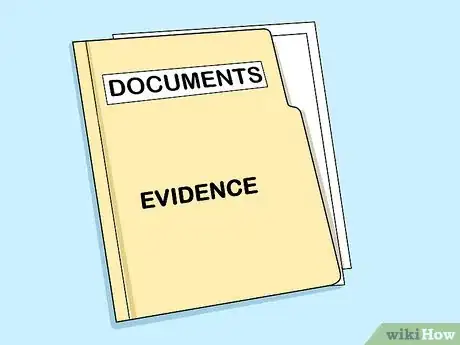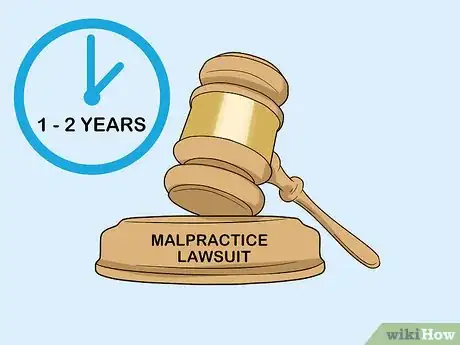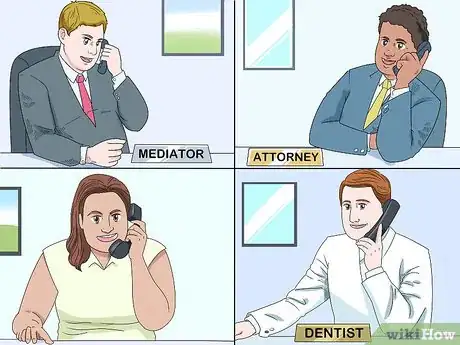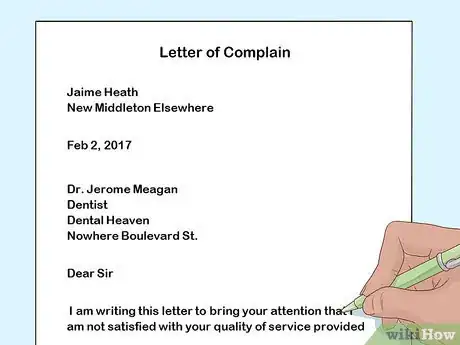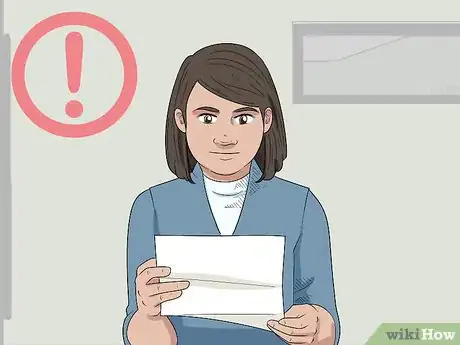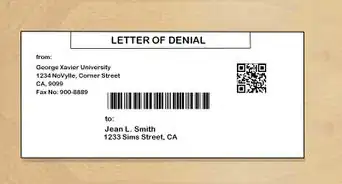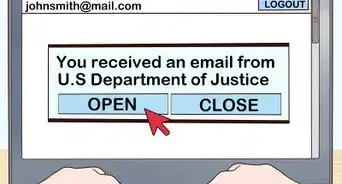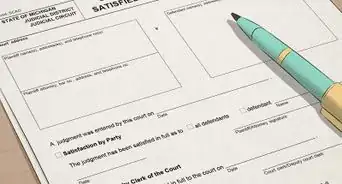This article was written by Jennifer Mueller, JD. Jennifer Mueller is an in-house legal expert at wikiHow. Jennifer reviews, fact-checks, and evaluates wikiHow's legal content to ensure thoroughness and accuracy. She received her JD from Indiana University Maurer School of Law in 2006.
This article has been viewed 26,379 times.
Like any other medical professional, dentists in the U.S. can be sued for malpractice if they fail to provide the acceptable standard of care. This might happen if a dentist leaves a broken instrument in your mouth, or if you suffer an injury as a result of the dentist's negligence.[1] Malpractice suits are complex, and specific rules may vary depending on the state where you live. In most states, you must participate in mediation before you can file a malpractice lawsuit.
Steps
Building Your Case
-
1Contact your dentist. Before you sue your dentist, make an effort to talk to them about what happened. They may be able to give you a greater understanding of what may have gone wrong. They also may offer additional services to remedy your problem.[2]
- Many states require you to make some effort to work directly with your dentist before you take additional steps towards litigation. Even if it isn't required by state law, it's generally more efficient to give your dentist an opportunity to address the problem.
- If you feel uncomfortable talking to your dentist after what happened, you may want to get a friend or family member to contact them on your behalf. The information the dentist can provide that person may be limited for privacy reasons.
-
2Get examined by another dentist. A dentist's standard of care is based on what a reasonable dentist would do in their situation. Before you sue your dentist, find out from another dentist whether your malpractice claim has merit.[3]
- Some states require you to provide a certificate of merit from another dentist before you can proceed with a dental malpractice lawsuit. Even if your state doesn't require a certificate, you'll still need dentists to testify regarding the treatment and your dentist's standard of care.
- Look for a dentist in your area who is the same type of dentist as the one who performed the treatment that caused your problem. For example, if the dentist you're considering suing for malpractice is a general dentist, your second dentist should also be a general dentist.
Advertisement -
3Gather documents to support your claim. To prove a malpractice case, you must show that the dentist failed to provide the appropriate standard of care in treating you. That failure must have caused specific injuries to you that cost you money or resulted in pain and suffering.[4]
- Start creating a file with all the documents and information you have concerning your dental treatment. Include bills or forms from previous appointments with the same dentist, as they'll help establish your dental history.
- Keep receipts of any expenses or losses you incurred as a result of the injury you sustained. For example, if you had to cancel a presentation because you couldn't speak due to jaw pain, you would have losses of any sales or income you could expect from that presentation.
- Contact the dental licensing board or regulatory authority in your state and ask for documentation on treatment protocols relevant to the procedure that caused your injury. These will help you understand and establish the dentist's standard of care.
-
4Check your state's statute of limitations. A statute of limitations is a deadline for filing a lawsuit. For dental malpractice, this deadline is measured from the date your injury occurred in most cases.[5]
- These deadlines are relatively short for all personal injury cases, and can be even shorter for malpractice lawsuits. Typically you only have 1 to 2 years from the date your injury occurred to file a lawsuit.
- You may have more time to file if you had no way of knowing about the injury until months or even years after it occurred. A malpractice attorney will be able to tell you exactly how long you have.
-
5Consult an attorney experienced in dental malpractice. Malpractice is a complex field of law, and the dentist is guaranteed to have an attorney. An attorney with experience representing people like you in dental malpractice cases is essential to ensure the best possible outcome.[6]
- Most malpractice attorneys provide a free initial consultation. Use this opportunity to shop around and interview several attorneys so you can make an informed choice.
- Malpractice attorneys typically work on contingency, which means you won't have to pay your attorney anything unless you win your case. If you win your case (or settle out of court), your attorney will take a percentage of your award or settlement amount.
Participating in Mediation
-
1Decide whether you want an attorney to represent you in mediation. Mediation is a process where you and your dentist sit down with a neutral third party and try to resolve your claim outside of court. While you don't need an attorney for this process, it's advisable to have one.[7]
- Mediation is much less formal than a court proceeding, and most court rules of evidence and procedure don't apply. This may make it easier for you to simply represent yourself.
- Your dentist will have an attorney, and this may place you at a disadvantage. While the mediator will attempt to level the playing field, they are not your attorney and don't represent your interests.
-
2Request mediation through the court. In most states, if mediation is legally required before you can file a malpractice lawsuit, you go through the court. Each state has its own system of appointing skilled neutral mediators.[8]
- If you go through the court system, they typically have a form for you to fill out that identifies you and your dentist and describes your claim in general terms.
- Based on the information in your form, the court appoints a mediator. The court then sends notice to you (or your attorney) telling you who the mediator is and how to contact them.
-
3Submit notice if you're using a private mediator. Your attorney may have a particular mediation service they typically use and prefer to the court system. Most states allow this provided you notify the court of the service you're using.[9]
- If you've decided not to use an attorney through the mediation process, a court-appointed mediator usually will be the easiest and most cost-effective for you. Court-appointed mediators typically don't charge for their services, while a private mediator may cost you several hundred dollars.
-
4Arrange a conference with the mediator. After you've identified your mediator, you'll typically have a conference call along with your dentist and their attorney. During this call, the mediator explains the basic mediation process and answers any questions you may have.[10]
- You may be required to submit a written summary of your claim and the money or other remedies to which you believe you're entitled.
- The mediator will set deadlines and let you know the time and place of your mediation hearing.
-
5Prepare documents and information to support your position. Make copies of the original documents you gathered when you were building your case. If you're required to submit a written statement or memo to the mediator, use these documents to support your claim.[11]
- Don't submit any original documents to the mediator – you may not get them back.
- Organize all your documents in chronological order. It can help to create a basic timeline with specific dates, starting when the injury occurred or immediately before.
-
6Attend your mediation hearing. While mediation is less formal than court, you should still dress conservatively and respectfully. Arrive at the mediation location early with organized copies of all of your documents.[12]
- Typically the mediator will meet with all parties and go over some ground rules for mediation. Then you may be separated. The mediator will go back and forth between you and your dentist and attempt to facilitate a resolution to your claim.
- If you reach an agreement, the mediator will bring everyone back together to discuss the details of the settlement. You aren't required to reach an agreement, and it's okay to reject your dentist's offer if you don't think it's adequate for the injury you suffered.
- If you have an attorney, they may advise you on whether to accept a settlement. However, the final decision rests with you.
Initiating Your Lawsuit
-
1Identify the correct court. In most cases, you'll file your malpractice lawsuit in the general state civil court located in the same county as your dentist's office. Some states have special courts that exclusively handle malpractice cases.[13]
- If you haven't already hired an attorney at this stage, narrow your search to someone who has experience practicing in the court where you plan to file your lawsuit. They will be more familiar with the court procedures and staff than an attorney who regularly practices in different courts.
-
2Draft your complaint. Your complaint is the court document that officially starts your case. It identifies you and your dentist and lays out the basic elements of your claim in general terms. You don't need to provide any evidence to support your claims at this stage.[14]
- Your attorney typically will go over the complaint with you to make sure everything is accurate.
- Depending on your state's law, there may be other documents that must accompany a malpractice complaint, such as a certificate of merit from another dentist who examined you, or a statement from the mediator if mandatory mediation is required.
-
3File your complaint. Your attorney files your complaint with the clerk of the court where your lawsuit will be heard. If you have a contingency fee agreement with your attorney, they typically will pay these fees and add them to their costs.[15]
- Your attorney usually gives you a file-stamped copy of the complaint. Make sure you keep your copy in a safe place with your other original documents related to the case.
- Once the complaint is filed, it must be served on the dentist. Through this process, the court papers are delivered to the dentist, typically by a sheriff's deputy or private process server.
-
4Evaluate your dentist's answer. After your dentist receives your complaint, they have a limited time to respond. The amount of time they have depends on your state's law, but is typically 2 or 3 weeks. A copy of this answer will be delivered to your attorney.[16]
- The answer may be accompanied by a motion to dismiss. If your dentist does not believe your complaint establishes a legitimate malpractice claim, they'll ask the court to dismiss it. There are other reasons a lawsuit may be dismissed, such as if you filed in the wrong court or if the statute of limitations has already expired.
- Your attorney will go over the dentist's response with you. Depending on the nature of the dentist's response, you may have to file additional documents with the court or go to court hearings.
-
5Exchange documents and information through the discovery process. Discovery gives both you and your dentist an opportunity to dig deeper into your claim and find additional information about each other's positions. You'll typically have several interviews, called depositions, during discovery.[17]
- Your attorney will schedule a deposition with your dentist, as well as any dental hygienists or other staff who were present during your treatment. Your dentist's attorney will schedule a deposition of you as well.
- Typically you'll need other dentists to serve as expert witnesses for your case. Your dentist's attorney will want to interview any other dentists you plan to call as expert witnesses.
-
6Work with your attorney to prepare for trial. The discovery process may take months. During that time, many malpractice lawsuits are settled out of court. If you aren't able to reach a settlement with your dentist, your attorney will begin trial preparation when discovery is complete.[18]
- Your attorney may have multiple hearings and conferences with the judge to handle procedural issues associated with the trial.
- Your attorney also will prepare you to take the witness stand and answer questions about your treatment and the injury you suffered.
Warnings
- This article focuses on dental malpractice law in the United States. If you live in another country, consult a malpractice lawyer near you to determine if you have a claim.⧼thumbs_response⧽
- Dental work doesn't come with any guarantees of any particular result. You can't sue a dentist for malpractice just because you don't like how your teeth turned out.[19]⧼thumbs_response⧽
References
- ↑ https://www.hg.org/article.asp?id=23428
- ↑ http://injury.findlaw.com/medical-malpractice/first-steps-in-a-medical-malpractice-case.html
- ↑ http://injury.findlaw.com/medical-malpractice/first-steps-in-a-medical-malpractice-case.html
- ↑ https://www.hg.org/article.asp?id=23428
- ↑ http://injury.findlaw.com/medical-malpractice/first-steps-in-a-medical-malpractice-case.html
- ↑ https://www.hg.org/article.asp?id=23428
- ↑ https://www.dccourts.gov/services/civil-matters/mediation-in-medical-malpractice-cases
- ↑ https://www.dccourts.gov/services/civil-matters/mediation-in-medical-malpractice-cases
- ↑ https://www.dccourts.gov/services/civil-matters/mediation-in-medical-malpractice-cases
- ↑ https://www.courts.wa.gov/court_rules/?fa=court_rules.display&group=sup&set=cr&ruleid=supcr53.4
- ↑ https://www.courts.wa.gov/court_rules/?fa=court_rules.display&group=sup&set=cr&ruleid=supcr53.4
- ↑ https://www.courts.wa.gov/court_rules/?fa=court_rules.display&group=sup&set=cr&ruleid=supcr53.4
- ↑ http://www.occourts.org/self-help/civil/filingalawsuit.html
- ↑ http://litigation.findlaw.com/filing-a-lawsuit/what-to-expect-a-lawsuit-chronology.html
- ↑ http://litigation.findlaw.com/filing-a-lawsuit/what-to-expect-a-lawsuit-chronology.html
- ↑ http://litigation.findlaw.com/filing-a-lawsuit/what-to-expect-a-lawsuit-chronology.html
- ↑ http://litigation.findlaw.com/filing-a-lawsuit/what-to-expect-a-lawsuit-chronology.html
- ↑ http://litigation.findlaw.com/filing-a-lawsuit/what-to-expect-a-lawsuit-chronology.html
- ↑ https://www.hg.org/article.asp?id=23428


